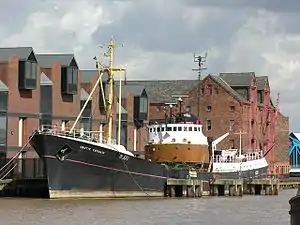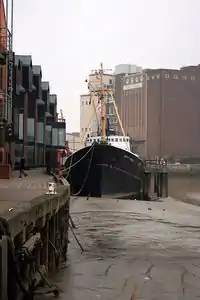Arctic Corsair
The Arctic Corsair (H320) is a deep-sea trawler, built in 1960, that was converted to a museum ship in 1999. She is temporarily berthed at Alexandra Dock in Kingston upon Hull, England, pending completion of a new permanent location in the city's Museums Quarter. Exhibits and guides aboard the boat tell the story of Hull's deep-sea fishing industry.
 Arctic Corsair in 2005 | |
| History | |
|---|---|
| Name: | Arctic Corsair[1] |
| Owner: | Boyd Line, Hull |
| Port of registry: | Hull |
| Builder: | Cook, Welton & Gemmell, Beverley |
| Yard number: | 959 |
| Launched: | 29 February 1960 |
| Out of service: | 1993 |
| Renamed: |
|
| Identification: |
|
| Status: | Museum ship |
| General characteristics | |
| Class and type: | Diesel side-fishing trawler |
| Tonnage: | 764 GRT, 256 NRT |
| Length: | 187.1 ft (57.0 m) |
| Beam: | 33.6 ft (10.2 m) |
| Installed power: | 1,800 bhp (1,300 kW) |
| Propulsion: | 6-cylinder Mirrlees Monarch diesel engine |
| Speed: | 15 knots (28 km/h) |
Description
The Arctic Corsair is Hull’s last surviving sidewinder trawler,[2] a type of ship that formed the backbone of the city’s deep sea fishing fleet. She was built in 1960, at Cook, Welton & Gemmell in Beverley, and was the second diesel-engined trawler built for the Boyd Line, the first being the Arctic Cavalier which was launched the previous month.[1] She was designed for the harsh conditions encountered in the Icelandic grounds, having a rivetted rather than welded hull.[3]
History
In September 1967 Arctic Corsair was holed on her starboard side in a collision off the coast of Scotland with the Irish collier Olive in thick fog.[3] Attempting to reach harbour in Wick she was beached in Sinclair Bay but eventually repaired and refloated.[1]
In 1973, she broke the world record for landing of cod and haddock from the White Sea.
On 30 April 1976 during the cod wars, she rammed the offshore patrol vessel ICGV Óðinn in the stern, after Óðinn had made three attempts to cut the Corsair's trawl warps.[4] The skipper, Charles Pitts, said that Icelandic seamen were becoming "more ambitious and dangerous in their tactics". With his ship holed below the waterline, and patched up temporarily by the Royal Navy, Pitts decided to head for home for permanent repairs.[5] Arctic Corsair was out of action for several months.[2][3] In 2017, the vessels, now both museum ships, exchanged their bells as a gesture of cooperation.[6]
In 1978 she was converted for midwater trawling, and in 1981 laid up at Hull. In 1985 she was taken out of retirement and reconverted for normal fishing. She was renamed Arctic Cavalier in 1988.
Museum ship

In 1991, a campaign led by Adam Fowler of fishing heritage group STAND secured £45,000 from the DTI Hull Task Force which enabled Hull City Council to purchase the trawler in 1993. The vessel immediately reverted to Arctic Corsair, and was berthed between Drypool Bridge and Myton Bridge in the River Hull as a museum ship.[1]
After being restored by trainees and volunteers from the STAND, the floating museum opened to the public in 1999. STAND entered into partnership with the City Council to provide volunteers to maintain and act as tour guides. Today, the floating museum is run entirely by volunteers but supported by Hull City Council. Arctic Corsair is temporarily closed during restoration work.[7]
In June 2018 to was announced that she was to move to dry-dock in September 2018 while flood defence work is undertaken on the River Hull.[8] This was delayed while other flood defence work was undertaken but on 4 August 2019 was she moved to a temporary berth in Alexandra Dock.[9][10][11] Later she will move to a new permanent berth in the redeveloped North End Shipyard in Dock Office Row as part of the Hull Maritime City project, back in the Museums Quarter.[12]
See also
- List of ship launches in 1960
- Middle-water trawler Ross Tiger, last surviving vessel of the rival fleet across the Humber at Grimsby
- Viola (trawler) Middle-water traditional 'bridge-aft-sider' trawler. In derelict condition with hopes of regeneration.
References
- and all infobox info:Thompson, Michael; Newton, Dave; Robinson, Richard; Lofthouse, Tony (1999). Cook, Welton & Gemmell: shipbuilders of Hull and Beverley. Hutton Press Ltd. p. 243. ISBN 1-902709-02-0.
- Hull City Council (2009). "Arctic Corsair". Archived from the original on 28 September 2008. Retrieved 25 February 2009.
- "A trawler built to withstand harsh conditions". Hull Daily Mail. Northcliffe Electronic Publishing. 24 September 2007. Retrieved 19 March 2009.
- "Holed trawler 'in no danger' after collision". The Times (Issue 59693). 1 May 1976. p. 4.
- Hornsby, Michael; Clayton, Hugh (5 May 1976). "Britain lays claim to 50 miles of fishing rights". The Times (Issue 59696). pp. 1, 5.
- "Cod Wars fishing vessels to exchange bells in cooperation gesture". BBC News. 20 February 2017. Retrieved 20 December 2019.
- "Arctic Corsair". Visit Hull and East Yorkshire. Archived from the original on 25 November 2018. Retrieved 20 December 2019.
- "Historic Hull trawler prepares to be moved to museum". BBC News. BBC. 8 June 2018. Retrieved 8 June 2018.
- "Date announced for Arctic Corsair's historic move on the River Hull". Hull Daily Mail. 15 July 2019. Retrieved 28 July 2019.
- "Arctic Corsair moved from home of 20 years". BBC News. 4 August 2019. Retrieved 4 August 2019.
- Emotional send off for Hull's Arctic Corsair [arctic corsair move] (online video). wearestoryboard.co.uk. 4 September 2019. Retrieved 13 November 2019.
- "The North End Shipyard". Hull: Yorkshire’s Maritime City. Hull City Council. Retrieved 20 December 2019.
External links
| Wikimedia Commons has media related to Arctic Corsair. |
- "Arctic Corsair" - Hull City Council